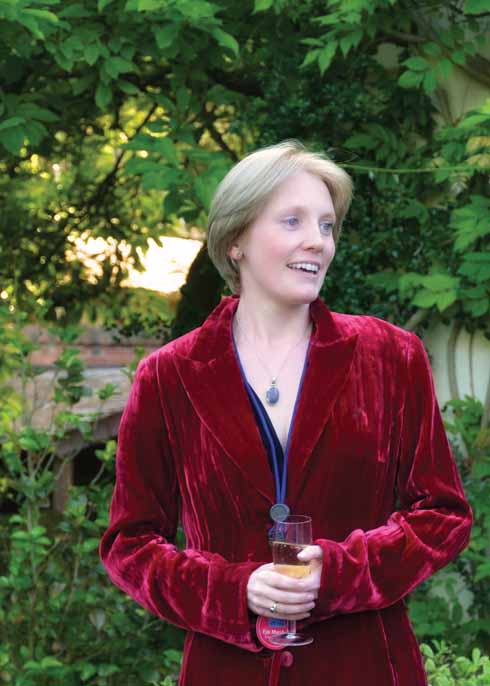
English Music Festival founder, Em Marshall-Luck
Em notes, July 2023
In this edition: new works at the Sixteenth English Music Festival and a CD tribute to Walter Leigh. Reviewed by Stuart Millson.
Approaching Dorchester-on-Thames from Henley takes the traveller through the England of Three Men in a Boat and The Wind in the Willows – via roadsides garlanded with early-summer cow parsley and, in the distance, the remnant rings of Anglo-Saxon earthworks. Close to Dorchester is the famous landscape feature Wittenham Clumps, a tree-crested hill, a symbol of pastoral continuity and the venue for this year’s English Music Festival.
Arriving at the great church in fine weather, QR enjoyed a preview of the opening-night concert: the BBC Concert Orchestra and their conductor, Martin Yates – with Raphael Wallfisch, soloist – hard at work in rehearsal for E.J. Moeran’s Cello Concerto. Written at the end of the Second World War for his wife, the cellist, Peers Coetmore, the concerto is a soulful piece – especially in the sad beauty of the slow movement – conjuring in the mind’s eye the lonely west coast of Ireland; although, it seems, there was no specific spirit-of-place intended by this gifted but troubled composer. Experiences in the First World War and a lifelong battle with alcohol had evidently taken their toll.
The Festival’s curtain-raiser, however, conveyed a quite different mood, in the form of Paul Lewis’s A Celebratory Overture – a world-premiere for the 80-year-old composer, well-known for his extensive work for film and television. Here are melodies and a witty, ingenious style of writing worthy of Malcolm Arnold. Celebrating the Festival’s founder, Mrs. Em Marshall-Luck, and in tribute to the new reign of King Charles lll, the overture generated much applause – its inclusion in the concert a testament to the EMF’s ambition as a sponsor of new music, as well as a curator of the old.
The evening continued with pieces by William Lloyd Webber, William Alwyn and Delius, leading up to the work of the night which many had come to hear: another world-premiere, this time of A Road All Paved with Stars by Ralph Vaughan Williams. Based on music from his 1929 opera, The Poisoned Kiss (and described as a synthesis of Gilbert and Sullivan, and Mozart’s The Magic Flute) the piece works as a ‘symphonic fantasy’ and is the result of dedicated sifting and knitting together of melodies by arranger, Adrian Williams, from a commission by the Vaughan Williams Society. At first glance, the description in the programme notes of the music might lead the listener to think that this was Vaughan Williams at his lightest. Not so. Although not in the same sound-world or emotional league as, say, the Ninth Symphony or Job, this clever distillation of an opera contained (especially at its opening and conclusion) great power, energy and the unmistakable uplift of Vaughan Williams – with much joie de vivre, sandwiched in between. Full marks to the on-form BBC Concert Orchestra for a sparkling rendition, which filled the air and space of the great Dorchester Abbey: the ideal setting for the visionary music of one of our greatest composers. Emerging into the Oxfordshire night-time at the concert’s end, our own road was indeed paved with stars – a clear night sky, and Dorchester’s taverns beckoning the Festivalgoers with foaming Abingdon Ale. ‘RVW’ would have surely approved.
The next morning at the Festival, violinist, Rupert Marshall-Luck, with pianist, Peter Cartwright, knuckled down for a solid programme of demanding, but fulfilling and deeply absorbing violin sonatas by Delius, Holst, Howells, Robin Milford and John Ireland. In his programme notes, Rupert likened the final movement of the Howell’s sonata, in E minor, op.38, dating from 1923, to the Jupiter movement from Holst’s The Planets. The performance certainly did justice to that spirit: an effortless release of optimism and shimmering notes. A Waltonian warmth also found its way into the proceedings, in the form of contemporary composer, Richard Blackford’s Tango, written a year ago.
On Saturday afternoon, at Silk Hall, Radley College, featured works by Armstrong Gibbs, Doreen Carwithen, Britten, Purcell and – Walter Leigh, a now overlooked composer, cut down in his prime at the battle for Tobruk. A pupil of Hindemith, Leigh is perhaps best known for his pastoral-sounding Harpsichord Concertino and music for A Midsummer Night’s Dream – an impression certainly countered by a rendition of his somewhat atonal and percussive Piano Sonata of 1926, played by Charles Wiffen. Soprano Sarah Stowe then accompanied Charles in Leigh’s salon-type songs, wistful and full of grace – laden with a light, sensuous nostalgia, setting English poetry across the ages: Francis Brett Young, Robert Bridges and Michael Drayton.
The somewhat dry acoustic of Silk Hall did not always do justice to the music – although the sonata’s modernity came over in all its rawness in this modern performance space. However, those wishing to find out more about Walter Leigh can now enjoy a CD of his songs (with the Piano Sonata also appearing in the line-up). The English Music Festival’s energetic front-of-house man, Kenrick Dance, has revealed new talents as a CD producer, the new niche lable of Tremula Records providing us with a range of Leigh’s ‘lost’ pieces; a tribute to his championing of a composer who might well have gone on to greater things, had war not intervened.
Stuart Millson is the Classical Music Editor of The Quarterly Review
CD details: Partings – a Walter Leigh Portfolio. Sarah Stowe, soprano; Charles Wiffen, piano. Catalogue reference: TREM 105.
Like this:
Like Loading...


Frances Brett Young’s THE ISLAND written eight decades ago has the line “To think what England once had been”. He died in 1954 at the height of postwar pride and national optimism. Little did he suspect what would become of “our goodly heritage”.